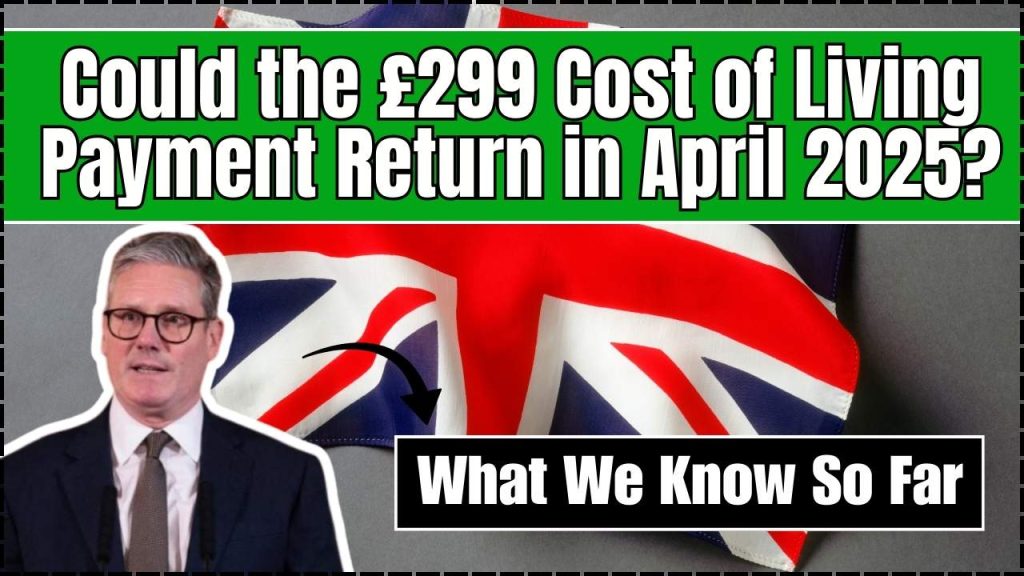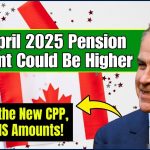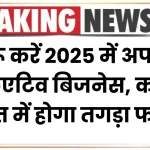
Cost of Living Payment Return in April 2025: Millions of UK households benefited from the £299 Cost of Living Payment in early 2024. But as we head into April 2025, many are asking the same question: Will the government bring back the £299 Cost of Living Payment in 2025?
With living costs still high and inflation putting pressure on families across the UK, this is not just a political talking point — it’s a genuine concern for people struggling to pay bills, buy groceries, and manage unexpected expenses. In this comprehensive guide, we explain what we know so far, explore official updates, and show you other ways to get financial help this year.
Cost of Living Payment Return in April 2025
| Topic | Details |
|---|---|
| Last £299 Payment | Paid between February 6–22, 2024 |
| Payment Eligibility | Universal Credit, Pension Credit, Income-based JSA, ESA, Tax Credits |
| Official Announcement | No confirmation for April 2025 payment yet |
| Household Support Fund | Extended to March 2026; offers help through councils |
| Benefits Uplift | 1.7% for most benefits; 4.1% for State Pension in April 2025 |
| Official Source | gov.uk – Cost of Living Payments |
While the £299 Cost of Living Payment is not confirmed for April 2025, this does not mean support has vanished. Councils, charities, and the central government are still offering vital help — if you know where to look. With rising costs, it’s more important than ever to be proactive. Use tools, apply for available aid, and plan ahead to protect your finances.
Remember: You are not alone. Help exists — and it’s easier to access than you think.
What Was the £299 Cost of Living Payment?
The £299 Cost of Living Payment was the final installment of a larger £900 support package launched by the UK government during 2023–2024. These payments aimed to cushion the blow of inflation, energy bill hikes, and rising food prices for millions of low-income households. The three payments were:
- £301 (Spring 2023)
- £300 (Autumn 2023)
- £299 (February 2024)
Each of these payments was non-taxable, did not affect existing benefits, and was automatically deposited into eligible claimants’ bank accounts. There was no need to apply — the payments were issued through the Department for Work and Pensions (DWP) or HMRC, depending on the type of benefit a household received.
The support was specifically targeted at people receiving means-tested benefits, including:
- Universal Credit
- Pension Credit
- Income-based Jobseeker’s Allowance (JSA)
- Income-related Employment and Support Allowance (ESA)
- Income Support
- Working Tax Credit or Child Tax Credit
Will the £299 Cost of Living Payment Return in April 2025?
As of now, there is no official confirmation that the UK government will issue another £299 payment in April 2025. However, that doesn’t mean all hope is lost. Here are three critical areas to watch:
1. General Election 2025 and Manifestos
The upcoming UK general election, expected by January 2025, could play a key role in deciding whether similar payments return. Political parties may include cost-of-living support in their manifestos to win over voters, especially as economic hardship remains a top voter concern.
Public pressure, especially from anti-poverty campaigners and think tanks, may also influence future policy decisions. If inflation spikes again or energy prices climb unexpectedly, the government may be forced to respond with new financial aid.
2. The Extended Household Support Fund
The Household Support Fund (HSF) is one of the most important ongoing support mechanisms. First introduced in 2021 and now extended until March 2026, the fund gives local councils the power to provide urgent help — including food vouchers, utility bill payments, clothing assistance, and emergency cash — to residents in need.
You can apply for help directly through your local council:
- Use this tool: Find your local council
This fund is not just for people on benefits. If you’re working but struggling due to low income, high rent, or unexpected expenses, you might still qualify.
3. Benefits and Pension Uplifts in April 2025
Even though there’s no confirmed lump-sum payment, the government is adjusting benefits starting April 2025. Here’s what’s changing:
- Most DWP benefits, including Universal Credit, will rise by 1.7%.
- The State Pension will increase by 4.1%, following the triple-lock formula (based on the highest of inflation, earnings growth, or 2.5%).
These increases are designed to reflect the previous year’s inflation data (September 2024 CPI) and wage growth.
Alternative Support Available in April 2025
If you’re worried about the lack of a £299 payment, don’t panic — other support is available. Many of these schemes are quietly helping thousands every day:
Local Council Aid
- Depending on your area, councils may offer:
- Supermarket vouchers
- Fuel grants for heating bills
- White goods and school uniforms
- Apply via your council’s welfare assistance program.
Winter Fuel Payments & Cold Weather Payments
- If you were born before 25 September 1957, you may receive a Winter Fuel Payment worth £250 to £600, depending on your circumstances.
- Cold Weather Payments are £25 per week during very cold snaps (below 0°C for 7 consecutive days).
Energy Bill Help Through the Price Cap
- Ofgem’s Energy Price Cap continues to protect consumers from sky-high rates. The April 2025 cap is expected to bring bills down slightly, but prices remain higher than pre-pandemic levels.
- Always check whether you can switch providers or apply for a hardship fund with your current supplier.
Budgeting Advances for Universal Credit Claimants
- If you’re receiving Universal Credit, you may be able to request a Budgeting Advance to cover urgent costs like a broken appliance or unexpected car repair.
- Repayments are spread over time and deducted from your future UC payments.
How to Prepare Financially If the £299 Payment Doesn’t Return
While you wait for further announcements, the smartest thing you can do is get financially prepared. Here’s how:
1. Check Your Full Benefit Entitlement
It’s shocking how many people miss out on support simply because they don’t know it exists. Use a government-approved calculator to see what you qualify for
2. Seek Out Emergency Financial Support
Several charities and services offer practical help, advice, and even one-off grants. Try contacting:
- Citizens Advice – free legal, financial, and benefit guidance.
- StepChange – debt relief and budgeting support.
- Turn2us – helps connect people to charitable grants.
3. Use Tools to Track and Reduce Expenses
- Use a digital budget planner like MoneyHelper’s free tool
- Review your subscriptions, bills, and daily habits to cut costs without cutting quality of life.
What Are Experts Saying?
Leading analysts suggest that the era of universal cost-of-living payments may be over, replaced by more localised, targeted support. According to The Independent, the government is closely monitoring energy prices and inflation to determine whether future emergency payments are necessary.
Economists warn that rising council tax, higher housing costs, and stagnant wages may leave low-income families in a fragile position unless further aid is announced. Some political commentators expect a new support package to emerge ahead of the general election to win voter confidence.
DWP Sends Out Letters That Could Land You with a £5,000 Penalty – Are You at Risk?
DWP Easter Update: Benefit Payment Dates for 2025 Shift – Are You Affected?
Pension Boost! DWP Tells State Pensioners How to Claim Extra £434 a Month
FAQs About Cost of Living Payment Return in April 2025
Will there be another £299 Cost of Living Payment in April 2025?
As of now, no. The government has not announced any new cost of living payments for 2025.
Is the Household Support Fund still available in 2025?
Yes. The fund has been extended through March 2026. Check with your local council for eligibility and application details.
Can working people get help too?
Yes. You don’t have to be on benefits. If you’re earning a low income, you may still qualify for local support or charitable grants.
Are benefits going up in 2025?
Yes. Most benefits will increase by 1.7%, and State Pension will rise by 4.1%.











